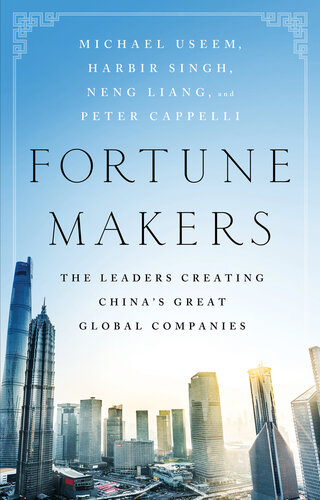
Fortune Makers
The Leaders Creating China's Great Global Companies
کتاب های مرتبط
- اطلاعات
- نقد و بررسی
- دیدگاه کاربران
نقد و بررسی

January 9, 2017
Four business school professors deliver a lively exploration of the Chinese way of doing business. As the introduction emphasizes, China’s economy has accelerated with astonishing speed in recent decades, and without the political liberties typically associated with capitalism. For readers interested in understanding this process from the inside, the authors describe how the leaders of Chinese companies such as Haier, Alibaba, and Lenovo think about business. They break down this unique mindset into seven key phrases or terms—“their own way forward,” “the learning company,” “strategic agility for the long game,” “talent management,” “the big boss,” “growth as gospel,” and “governance as partnership”—and devote a chapter to each. The authors also give a history of the growth of Chinese business in the 1980s and ’90s and provide highly detailed case studies from the companies under discussion. In the final chapter they observe that these once pioneering businesses have now attained a certain level of maturity and may become models for non-Chinese companies. The book also leaves readers with a question: with China’s culture shifting once again as a less-deferential generation enters the workforce, is the “China way” of business sustainable?

January 15, 2017
There are new markets to share out there, and the old capitalist way of doing things won't be the one that captures them.In this collaboration between researchers at the Wharton School and the China Europe International Business School, there are the usual tables depicting, say, the value of mergers and acquisitions over the last decade, and the usual nostrums about how Chinese society is governed, for all its communist veneer, by Confucian ideals. Beyond these to-be-expected features, though, lie some surprising insights into how the biggest players in the Chinese economy--beyond the state and military themselves--worked their ways into their positions and, more important, what makes them different from their counterparts in the West. Take Zhang Ruimin, for instance, CEO of the Haier Group, the world's largest appliance company. As a Red Guard during the Cultural Revolution, he was "charged with bringing down bourgeois elements within society, especially anybody associated with capitalism." He then rose through the ranks in construction and manufacturing, returning from a trip to Germany ashamed at the shoddiness of Chinese goods--so much so that, in the factory he now headed, he ordered that defective units be smashed to pieces. His experience in the Maoist era, the authors write, made him cautious and perhaps even fearful but also unusually committed to an economic experiment that is still playing out, based on the traditional guanxi ("personal networks of relations that give an executive access and influence") but also on some notable precepts--e.g., the idea that economic success should benefit all members of society and not just a few players. Examining several business leaders and their strategies, from "resetting the game" to eliminate weak positions to growing business partners and suppliers in concert with growing one's own business, the authors ably demonstrate how the once-countercultural practice of capitalism in China remains unlike the variety practiced in the West. Full of object lessons, this is a valuable overview for students of international commerce.
COPYRIGHT(2017) Kirkus Reviews, ALL RIGHTS RESERVED.

February 1, 2017
Coauthors Useem (director, Ctr. for Leadership and Change, Wharton Sch., Univ. of Pennsylvania), Harbir Singh (codirector, Mack. Inst. for Innovation Management, Wharton Sch., Univ. of Pennsylvania), Neng Liang (director, Case Development Ctr., China Europe Intl. Business Sch.), and Peter Cappelli (director, Ctr. for Human Resources, Wharton Sch., Univ. of Pennsylvania) explain how Chinese business leaders thrived, leading to the economic development that pulled over half a billion people out of poverty. They write that "when China first initiated its economic reforms in 1978, there were virtually no private enterprises in China and few indigenous traditions for China's would-be entrepreneurs to build upon or emulate." The authors offer an informative and balanced look at Chinese business leaders' success in an environment initially hostile to capitalist principles. This book is an excellent resource for those interested in China's business environment or economic development. It is informed by interviews of business leaders and examines leading companies, such as Lenovo and Alibaba, while providing a broader theoretical context to frame the discussion of Chinese and Western approaches to the marketplace. VERDICT A must-read for anyone interested in China's economic development or business environment.--Casey Watters, Singapore Management Univ.
Copyright 2017 Library Journal, LLC Used with permission.

























دیدگاه کاربران